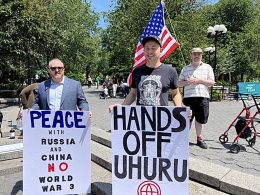The society that settler-colonialism builds is a society founded on parasitism. Its wealth doesn’t exist based on its own merits, but off of theft from the civilizations it extracts from. This applies to all of the imperialist countries, which aren’t necessarily settler-colonial. But settlerism adds an extra layer to the contradiction inherent within imperialism, because the group which benefits from the extraction both receives the wealth that’s siphoned from the peripheral countries, and does so while living on land that was stolen from indigenous peoples. They benefit from imperialism that’s both external, and internal to the settler state’s borders. These overarching types of empire, where the benefactors extract from both within and without, are what perpetuate the social base which maintains the United States.
Colonial chauvinism as an ideological defense mechanism
The opportunists within this parasitic structure, who seek to defend the imperialist order, use rhetorical tools to obfuscate the reality of its existence. They claim that talk of settler-colonialism is nothing more than race essentialism, an argument for original sin that portrays modern whites as guilty of the crimes of their ancestors. That’s if they even recognize those crimes as having been historical events; their first and foremost argument is that no genocide against the Natives took place, and that the current and historic racism against both Native and Black people is greatly exaggerated. Such ahistorical arguments make sense for capitalism’s ideological defenders, because capitalism is intertwined with colonialism and therefore can only be maintained by preserving the latter. But for self-proclaimed Marxists these ideas are totally inexcusable to uphold, and are indicative of “Marxists” that have incorporated opportunism into their concept of socialism.
This is because an analysis of settler-colonialism, and of the social base which makes up its defenders, is merely an extension of Lenin’s conclusion that a social base exists for imperialism. For any Marxist to claim settlerism isn’t relevant in modern America is to deny what Lenin observed in Imperialism about the material interests of certain elements of the masses within imperialist countries:
…monopoly yields superprofits, i.e., a surplus of profits over and above the capitalist profits that are normal and customary all over the world. The capitalists can devote a part (and not a small one, at that!) of these superprofits to bribe their own workers…A handful of wealthy countries…have developed monopoly to vast proportions, they obtain superprofits running into hundreds, if not thousands, of millions, they “ride the backs” of hundreds and hundreds of millions of people in other countries and fight among themselves for the division of the particularly rich, fat and particularly easy spoils…the bourgeoisie of an imperialist “Great” power can economically bribe the upper strata of “its” workers by spending…its superprofits
What happens when you combine this dynamic, in which imperialism cultivates a support base by bribing a substantial amount of the people in the core, with the USA’s foundations of forced territorial annexation? You get our current conditions, where settlerism and its ideology have such a strong hold over these bribed elements that they continue to ally with the capitalists in the class war, even after half a century of declining living standards. This ongoing loyalty to capital and empire isn’t the case for all white workers, and ultimately it may turn out to not be a case for the white workers as a whole. But many among the upper echelons of the white workers, and those with enough of a material interest in imperialism to hope to gain such special benefits, remain on the side of opportunism. Which, especially in our context of intensifying class struggle, means the side of fascism, the bourgeoisie’s fighting wing.
That’s why the concept Lenin talks about has been called the social base for opportunism, but switching “fascism” for “opportunism” can functionally make no difference; the logical conclusion of working to defend imperialism from decolonial and proletarian liberation efforts is the violent repression which fascism represents.
This reality of there being a substantial social base for fascism within the United States, encompassing a large amount of the population relative to most other countries, has been affirmed even by the Marxists I’ve encountered who vehemently reject race reductionism. The particular Marxist I’m speaking of has concluded that due to the imperialist arrangement which makes up the U.S. economy’s foundation, this country’s “middle class” (perhaps better specified as the upper stratum of the working class) doesn’t act like a normal middle class does. It’s unified in its allegiance to the ideology of the ruling class, and this is shown by how a solid third of the country is consistently loyal to the fascist MAGA movement—whose voters have been shown to be disproportionately either petty bourgeois or a little below that. The bulk of the MAGA voters can therefore more appropriately be called labor aristocrats than working class. Because in an imperialist country, the upper parts of what can most broadly be called the “working class” are largely labor aristocrats, and their political inclinations naturally trend towards the ideology of the ruling class.
The half or so of the country that’s now living in poverty, and the “precariat” which is constantly struggling to keep itself out of that poverty, do not make up the core of the Trumpist faction’s supporters. They ironically tend to fall closer to the class status of the Democratic Party’s most enthusiastic supporters, who are petty bourgeois opportunists that have a clear material interest in backing Biden’s neoliberal agenda. The only difference is that the Trumpists tend not to be coastal elites, and can therefore establish a tribal boundary of demarcation between themselves, and these other elements they’re competing with for shares of imperialism’s spoils. It’s that impoverished majority of working people who have the bulk of the country’s revolutionary potential, and who are increasingly mobilizing for labor power.
In theory, all stratums of the working class should be equally enthusiastic for proletarian revolution, and therefore for the reparations, tribal land jurisdiction restoration, and end to global imperialist extraction which proletarian revolution will require under our conditions. But some among the U.S. proletariat’s upper stratums are all too susceptible to the ideas the fascists are putting forth to defend settlerism, such as “the United States tamed a continent” or “curriculum on systemic racism is divisive propaganda.” In the more niche ideological circles, like the “patsoc” Marxists, these kinds of sentiments take on different articulations, usually focused around the idea that decolonization is futile to hope for. But they overwhelmingly center around erasure of Indigenous peoples (as is implied within the narrative that the tribes are now materially irrelevant to their ancestral lands) and the narrative that it’s possible to address the conditions of communities of color without focusing on the colonial question. When they’re the most honest, the fascists simply say “everyone besides us whites can go to hell,” but our ever-more-reactionary political climate isn’t yet at the stage where talking like that is acceptable.
The minority that’s invested itself in maintaining imperialism
These ideas are able to gain a receptive audience not just within the petty bourgeoisie—the historical social base for fascist movements in essentially all countries—but within some elements below the petty bourgeoisie. Because in an imperialist country, such a thing as a labor aristocracy exists. And in a settler-colonial imperialist country, imperialism’s spoils are able to reach enough of the population that there will be some working class individuals with enough of a material stake in imperialism to embrace the fascist narratives. To seek to increase their own status to that of the labor aristocracy or the bourgeoisie, even though they themselves don’t quite fit into either of these categories.
These are the types whose livelihoods, though not bourgeois per se, are more directly tied to imperialism and settler-colonialism than those lower than them on the class hierarchy. The student that believes their relative luck can propel them into prominence within the imperialist academia, political structure, or media; the individual with an extended family that’s bourgeois, and able to provide them with material benefits; sometimes even the worker whose means for making money depends on the resources that imperialist extraction provides, such as farmland on stolen Native territory or oil and gas reserves made accessible by colonization.
Obviously students, financially dependent people, and workers of all types have revolutionary potential; practically everyone does, and it would be undialectical to prematurely classify someone as a lost cause based on them having one too many contradictions. What makes someone a revolutionary is not them being from a dispossessed social status, but whether they’re willing to commit to the revolutionary cause. Yet the conditions people are surrounded by influence their consciousness, and the more contradictions someone has, the less likely they are to choose to embrace revolutionary thinking. If all of the relative comforts you enjoy are made possible by imperialist and settler-colonial extraction, you can quite easily be persuaded to aggressively reject all decolonial or anti-imperialist analyses.
I can’t possibly have contradictions, you might think; I engage in labor and I’m exploited to some tangible extent, so those contradictions can’t even be real. Who are these people who say they want to abolish the USA, give the land back to the tribes, pay reparations? The USA can’t be all bad, I’ve never even been to a reservation, and slavery ended long ago (or so I’m told). These people must have malicious intent, must be trying to carry out a genocide against me, establish a Native supremacist state, deport me to Europe! And so the process of fascist radicalization begins, potentially ending with the radicalized individual picking up a rifle and shooting up a store in a nonwhite neighborhood.
Given this reality of the ideological power fascism can hold, communists must be willing to accept anyone into our organizations regardless of their social status, and we must always explain our positions to those willing to listen. This commitment to ideological struggle doesn’t mean we should fetishize the elements of the masses that are statistically the least likely to embrace revolutionary consciousness, or pander to the reactionary ideas which these elements tend to be predisposed towards. We shouldn’t abandon solidarity with colonized peoples and embrace some bastardized “patriotic” version of socialism, with the hope that this will bring rightists and the political “center” towards viewing Marxism favorably. A “Marxism” that’s opposed to Indigenous self-determination and slavery reparations would not even be Marxism, but something akin to when Germany’s fascists adopted the “socialist” label.
In other words, a genocidal project, extending the USA’s colonial war, that merely replaces the class subjugation of capitalism with national subjugation. The twisted “pro-working class” logic behind this, where an exclusive category of working people are allowed to receive the benefits of their labor while those outside of it are denied what colonialism took from them, is reflected by the social imperialism which Democratic “progressives” put forth. The imperialist-minded individual sees the USA’s declining living standards and concludes not that they should ally with all proletarians in defeating capitalism and imperialism, but that they should work to intensify or maintain extraction from imperialism’s colonies. In fact, that’s the exact thought process which the British capitalist Cecil Rhodes underwent in order to rationalize his establishment of a genocidal African apartheid state: in order to alleviate the poverty that capitalism subjects the British masses to, imperialism must be expanded, and colonized peoples must pay for the costs of capitalism’s crises.
Such an imperialist “socialism” would doom itself, meeting resistance from the colonized nations and therefore ending up either overthrown by these nations, or getting successfully destroyed by the bourgeoisie due to the self-destructive division it caused within the socialist movement. Socialism can’t win if it’s perverted to advance imperialism. Its path to victory runs through solidarity with all the nations which are fighting to end the imperialist order. The elements of the masses that are materially incentivized to oppose this solidarity represent a tiny minority of the global population, the less than ten percent of humanity which Mao implicitly alluded to when he predicted that over ninety percent of the world will ultimately rise up against imperialism. This obstinately reactionary element, a minority even within the imperial center, has no future. The parasitic order that it’s materially invested in will be wiped away by the forces of liberation struggle.—————————————————————————
If you appreciate my work, I hope you become a one-time or regular donor to my Patreon account. Like most of us, I’m feeling the economic pinch during late-stage capitalism, and I need money to keep fighting for a new system that works for all of us. Go to my Patreon here.








